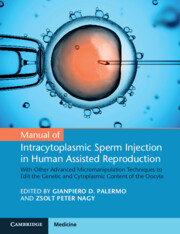 Manual of Intracytoplasmic Sperm Injection in Human Assisted Reproduction
Manual of Intracytoplasmic Sperm Injection in Human Assisted Reproduction Published online by Cambridge University Press: 02 December 2021
The female germline undergoes a unique sequence of differentiation processes that finally endows the eggs with totipotency. The reconstitution in vitro of oogenesis using pluripotent stem cells, which eventually produces “artificial eggs,” has long been sought in reproductive biology and medicine, as this would contribute not only to a better understanding of the basic mechanisms underlying totipotency, but also to an alternative source of gametes for reproduction. This chapter introduces a scientific background, the current status and the prospects of artificial eggs in mice and humans.
To save this book to your Kindle, first ensure no-reply@cambridge.org is added to your Approved Personal Document E-mail List under your Personal Document Settings on the Manage Your Content and Devices page of your Amazon account. Then enter the ‘name’ part of your Kindle email address below. Find out more about saving to your Kindle.
Note you can select to save to either the @free.kindle.com or @kindle.com variations. ‘@free.kindle.com’ emails are free but can only be saved to your device when it is connected to wi-fi. ‘@kindle.com’ emails can be delivered even when you are not connected to wi-fi, but note that service fees apply.
Find out more about the Kindle Personal Document Service.
To save content items to your account, please confirm that you agree to abide by our usage policies. If this is the first time you use this feature, you will be asked to authorise Cambridge Core to connect with your account. Find out more about saving content to Dropbox.
To save content items to your account, please confirm that you agree to abide by our usage policies. If this is the first time you use this feature, you will be asked to authorise Cambridge Core to connect with your account. Find out more about saving content to Google Drive.